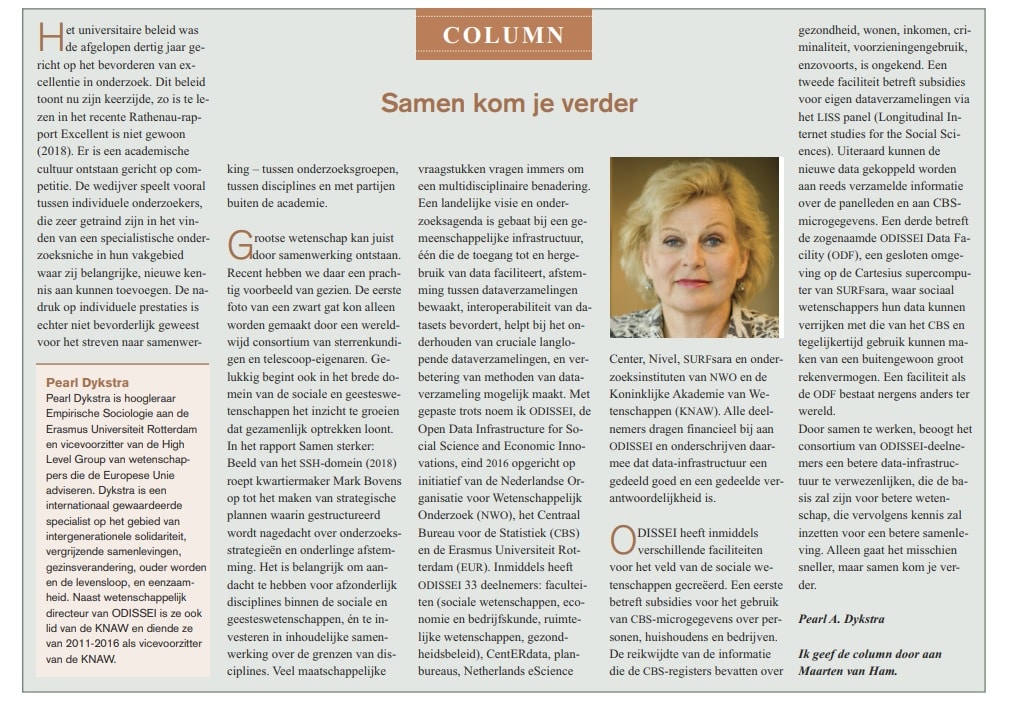In the latest edition of e-Data & Research much attention is paid to ODISSEI. Scientific director Pearl Dijkstra wrote a column on the importance of cooperation for reaching your scientific goals (see English translation below). Anne Gielen (Erasmus University Rotterdam) was interviewed on her research on the long term effects of the adjustments made to the Dutch disability benefits in the nineties. She used CBS Microdata for her analysis.
e-Data & Research can be downloaded here (in Dutch only).
Column: Traveling farther by working together
For the past 30 years, university policy has focussed on stimulating excellence in research. The downsides of this policy are steadily becoming apparent, as pointed out in the recently published Rathenau report Excellent is niet gewoon (‘Excellent is not normal’, 2018). The policy has resulted in an academic culture that is strongly centred on competition. Rivalry reveals itself among academics who receive ample training in how to identify a research niche, a specialized corner of their scholarly field where they have the potential to bring important, new knowledge. The emphasis on individual accomplishments has not been very conducive to the promotion of closer collaboration – between research groups, between disciplines and with parties outside academia.
The competitive focus is all the more unfortunate given that collaboration can lead to great science! We recently witnessed a wonderful example. The first photograph of a black hole could only be taken when astronomers and telescope owners joined strengths in a worldwide consortium. Fortunately, within the broad domain of the social sciences and the humanities (SSH), the idea that working together pays off is also gaining ground. In the report Samen sterker: Beeld van het SSH-domein (‘Stronger together – Overview of the SSH domain’, 2018), quartermaster Mark Bovens calls on the sector to develop strategic plans that include a structured reflection on research strategies and mutual coordination. It is not only critical to pay attention to individual disciplines within the social sciences and the humanities, but also to invest in substantive collaboration beyond the boundaries of these disciplines. After all, many societal challenges call for a multidisciplinary approach.
A national vision and research agenda will benefit from a shared infrastructure – one that facilitates access to and re-use of data, safeguards coordination between data collections, promotes the interoperability of data sets, helps to maintain crucial, long-term data collections, and enables the improvement of data collection methods. With some pride, I refer to ODISSEI – the Open Data Infrastructure for Social Science and Economic Innovations – which was set up in late 2016 at the initiative of the Dutch Research Council (NWO), Statistics Netherlands (CBS) and Erasmus University Rotterdam (EUR). By now, ODISSEI has no fewer than 33 participating organisations: faculties (social sciences, economics and business administration, spatial sciences, and health policy), CentERdata, national planning offices, Netherlands eScience Center, Nivel, SURFsara, and research institutes within NWO and the Royal Netherlands Academy of Arts and Sciences (KNAW). Each of these participants contributes financially to ODISSEI, effectively subscribing to the notion of data infrastructure as a public good and a shared responsibility.
Since its launch, ODISSEI has created a number of facilities for the social sciences. The first involves grants for the use of CBS microdata on individuals, households and companies. Information contained in CBS registries about health, housing, income, crime, use of public provisions, etc, has an unprecedented scope and scale. A second facility pertains to grants for new data collections via the LISS panel (Longitudinal Internet studies for the Social Sciences). It goes without saying that the newly collected data can be linked to information that has already been collected on panel members as well as to CBS microdata. A third facility concerns the so-called ODISSEI Data Facility (ODF), a closed environment on SURFsara’s supercomputer Cartesius, where social scientists can enrich their data with data provided by CBS, while simultaneously taking advantage of the system’s extraordinary computing power. A facility like the ODF does not exist anywhere else in the world.
By working together, the consortium of ODISSEI participants aims to realise a better data infrastructure, which will lead to better social science for the creation of a better society. Working on one’s own might be quicker, but by working together one can travel a lot farther.
Pearl A. Dykstra Pearl Dykstra is Professor of Empirical Sociology at Erasmus University Rotterdam. In addition, she serves as Vice Chair of the group of Chief Scientific Advisers to the European Commission. Dykstra’s publications focus on intergenerational solidarity, aging societies, family change, aging and the life course, and late-life well-being. Besides her position as ODISSEI’s Scientific Director, Dykstra is a member of the Royal Netherlands Academy of Arts and Sciences (KNAW) and served as its Vice-President from 2011 to 2016.
